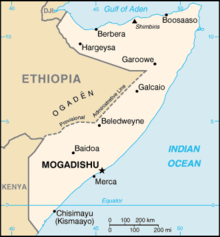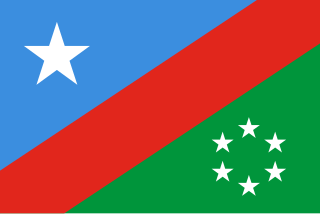
The South-West State of Somalia, is a Federal Member State in southwestern Somalia. It was founded by Hasan Muhammad Nur Shatigadud, leader of the Somalia RRA on 1 April 2002. It was the third autonomous region to be established.

Human rights in Somalia throughout the late 20th-century and early 21st-century were considered dire, but have gradually improved over the following years. Human rights are guaranteed in the Federal Constitution, which was adopted in August 2012. They fall under the Ministry of Human Rights established in August 2013. The central authorities concurrently inaugurated a National Human Rights Day, endorsed an official Human Rights Roadmap, and completed Somalia's first National Gender Policy.
The AIRE Centre is an English registered charity, with offices located in London. It provides free legal advice on human rights and EU law issues in Europe, and seeks to promote the dissemination of information about international human rights law throughout Europe.

Mass media in Somalia includes various radio, television, print and internet outlets. The federal government operates two official radio and TV networks, which exist alongside a number of private and foreign stations. Print media in the country is progressively giving way to news radio stations and online portals, as internet connectivity and access increases. In February 2013, the Ministry of Information, Posts and Telecommunication also launched a broad-based consultative process for the reformation of media legislation.
The 2008 Battle of Mogadishu began when Ethiopian soldiers started entering insurgent-held parts of the city which sparked heavy street fighting. Between 126 and 142 people died in the fighting. The battle usually includes the date, when referenced, in order to distinguish it amongst the nine major Battles of Mogadishu during the decades long Somali Civil War.
Mustafa Haji Abdinur is a Somali journalist and radio correspondent. He was awarded a CPJ International Press Freedom Award by the Committee to Protect Journalists in 2009.
The Muna Hotel in the Somali capital of Mogadishu was attacked by al-Shabaab fighters on 24 August 2010. The hotel was known to host government officials and other politicians. More fighting in the city began on 23 August.
The Federal Government of Somalia (FGS) is the internationally recognised government of Somalia, and the first attempt to create a central government in Somalia since the collapse of the Somali Democratic Republic. It replaced the Transitional Federal Government (TFG) of Somalia on 20 August 2012 with the adoption of the Constitution of Somalia.

Hassan Sheikh Mohamud is a Somali politician who has served as the president of Somalia since May 2022. He is the founder and current chairman of the Union for Peace and Development Party. He was indirectly elected as President of the Federal Republic of Somalia on 15 May 2022, defeating the incumbent president Mohamed Abdullahi Mohamed Farmajo. He previously served in the same position as the 8th president of Somalia from 2012 to 2017. A civil and political rights activist, Hassan was previously a university professor and dean at SIMAD University, which he co-founded.
Oxfam Novib/PEN Award for Freedom of Expression is a literary award made in collaboration with PEN International Writers in Prison Committee, the PEN Emergency Fund, and Oxfam Novib. The award is to recognize writers who have been persecuted for their work and continue working despite the consequences. Honorees receive €2,500.

Abdi Farah Shirdon is a Somali businessman, economist and politician. He served as the Prime Minister of Somalia between October 2012 and December 2013. Shirdon is credited with having overseen significant development in social services and the national budget, as well as improving local security.
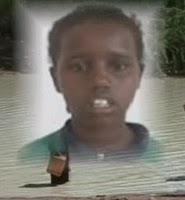
The stoning of Aisha Ibrahim Duhulow was a public execution carried out by the Al-Shabaab militant group on 27 October 2008 in the southern port town of Kismayo, Somalia. Duhulow's father and aunt stated that she was a 13-year-old girl and that she had been arrested and stoned to death after trying to report that she had been raped. Initial reports had stated that Duhulow was a 23-year-old woman found guilty of adultery; she was, however, under the age of marriage eligibility. The execution took place in a public stadium attended by about 1,000 bystanders, several of whom attempted to intervene but were shot by the militants.

This is a 2015 timeline of events in the Somali Civil War (2009–present).
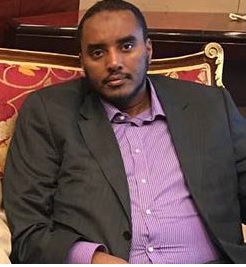
Fahad Yasin Haji Dahir,, commonly known only as Fahad Yasin, is a Somali civil servant and politician, as well as a former journalist. He was also the campaign manager for Mohamed Abdullahi Mohamed "Farmaajo" in the 2017 elections. After the elections, he was appointed Chief of Staff for Villa Somalia and then Director General of the National Intelligence and Security Agency (NISA). Farmaajo subsequently appointed him as his national security advisor.
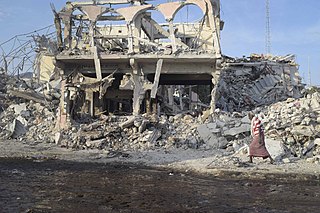
On 14 October 2017, two truck bombings took place in Mogadishu, the capital of Somalia, killing at least 587 people and injuring 316 others. Almost all of the casualties were caused by one of the trucks, which detonated when the driver, while attempting to escape from security officials, crashed through a barrier and exploded in the Hodan District, destroying a hotel. The intended target of the attack is believed to have been a secure compound housing international agencies and troops. The second blast happened close by, killing two people. A third explosives-laden truck was captured by police.
In Somalia, freedom of speech and freedom of the media is guaranteed under the Somali Constitution established when the Federal Government was established in 2012. However, while there are swathes of blogs along with nearly 100 established media outlets, the culture of journalism has been violated with violence, arbitrary arrests, persecution, and suppression of the media.
Abdiaziz Mohamud Guled, also known Abdiaziz Afrika professionally as Thatjama, is a prominent Somali journalist. Born in Mogadishu, But Based in London, Guled was initially known for his work in private radio and television stations prior to joining Somali National Television and Radio around 2009. In November 2020, Guled was appointed director of the Somali federal state-run Radio Mogadishu, a position he held until his assassination in 20 November 2021.
